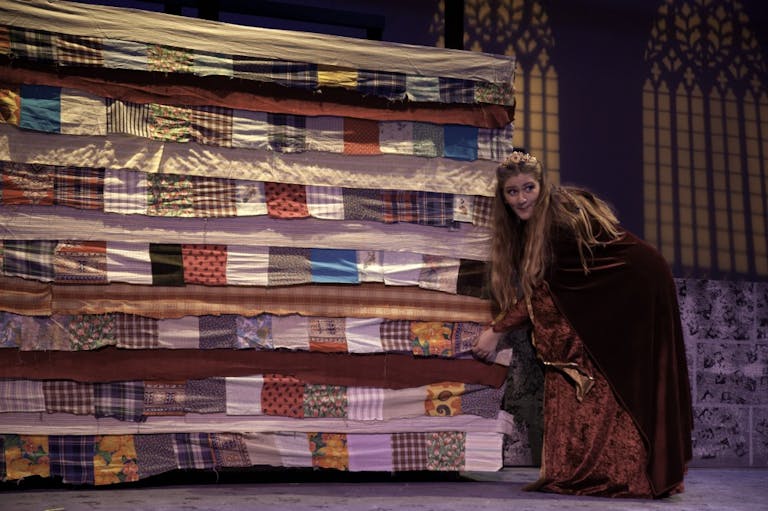‘Once Upon a Mattress’ fails to a-Peas
Review — It is never a good sign when the opening lines of a theater review begin writing themselves in my head mere minutes after the rise of the curtain. The thing is that, at a truly good show, I am swept up into the action of the play and words evade me; I get invested and involved. At the opening night of the Undergraduate Theater Collective’s production of “Once Upon a Mattress,” a retelling of Hans Christian Andersen’s “The Princess and the Pea,” I had the former experience; the production failed to harness my full attention, and I was left with no choice but to conceive sentences in my head to describe what I was experiencing in front of me.
“Once Upon a Mattress” begins with a Minstrel (Kaitlin Cavallo ’21) introducing the conflict at hand: An awkward boy named Prince Dauntless (Zack Garrity ’20) is left insufferably single by a domineering mother (played with dedication by Lily Bickerstaff Richard ’20) who continuously thwarts his attempts to find a bride. The problem is that the marriage prospects of Dauntless’ multiple contemporaries rely on him getting married first. Most affected by this marriage ban is Sir Harry (Nathan Schneider ’18), whose lover, Lady Larkin (Jacqie Wycoff ’21), is expecting a child out of wedlock. Motivated by his need to cover up his premarital affair, Sir Harry ventures out to find a suitable princess for Dauntless — one that the Queen will approve of. He returns with Princess Winnifred (Rachel Greene ’20), who is, at the very least, off the beaten path.

BIG FINISH: Winnifred (Rachel Greene ’20) and Prince Dauntless (Zack Garrity ’20) stand together after an exhausting dance.
As far as performance is concerned, it was Bickerstaff Richard’s confident performance as the Queen that carried the show. Greene demonstrated an affinity for whimsy with her interpretation of Winnifred, which was certainly enjoyable. In particular, Greene’s willingness to play Winnifred’s sloppiness to the utmost extent was a highlight. It was by virtue of these two strong performances that the show had a backbone.
On the technical side of things, standouts included Liora Lilienthal’s ’20 tastefully elaborate choreography and Melody Wilkenfeld’s ’18 costume design. The dance numbers were energetic and perfectly evocative of the chaotic storyline that evolved on stage.
Unfortunately, there were some rather glaring technical issues. Particularly, the music direction at the opening night performance I attended was overpowering the voices of the actors who were singing on stage, sometimes to the point that I could not hear words clearly. There is a certain sensation I experience during a good musical-dance number: chills. The hair rises on my arms, I may even get teary eyed and my ears feel all hot. This tends to occur in the moment that the music, dance and visuals of a production blend in perfect harmony. I had no such experience viewing “Mattress.” Additionally, scene transitions were handled rather inefficiently. I recall that after a few musical numbers, audience applause would be followed by awkward silences in which nothing happened on stage.
The biggest stumbling block in this production was that it failed to elevate its source material in any way. Now, not all shows must elevate their source material. However, in the case of “Once Upon a Mattress,” a show with an incredibly juvenile premise, one might have hoped that a university production team would have attempted to inject some relevance into the show for its target audience to respond to.

MOMMA’S BOY: Queen Aggravain (Lily Bickerstaff Richard ’20) slips a pea under Winnifred’s mattresses.
Most disappointing, though, is that my desire to enjoy this production was crushed so early on into the performance. It is not as if the cast and crew were not giving their all; they clearly worked very hard on their flawed finished product. The shame is that their efforts hardly bore fruit. The show was akin to a half-baked cake, containing all of the right ingredients, but ultimately lacking complete digestive appeal.
Here is a fact of life: there are hits, there are misses, and there are things that fall somewhere in between. Here is another fact: just because somebody does something poorly one time, that does not mean that they are bad at what they were trying to do. For instance, Julie Taymor directed Broadway’s “The Lion King,” an absolute triumph, but she also directed “Spiderman: Turn Off the Dark,” a musical that was born with no shortage of ambition, but managed to fall flat nonetheless. It is a bold thing for an artist to present their work. That act alone is commendable. With that in mind, I keep an open mind; I look forward to whatever the UTC offers us next.



Please note All comments are eligible for publication in The Justice.